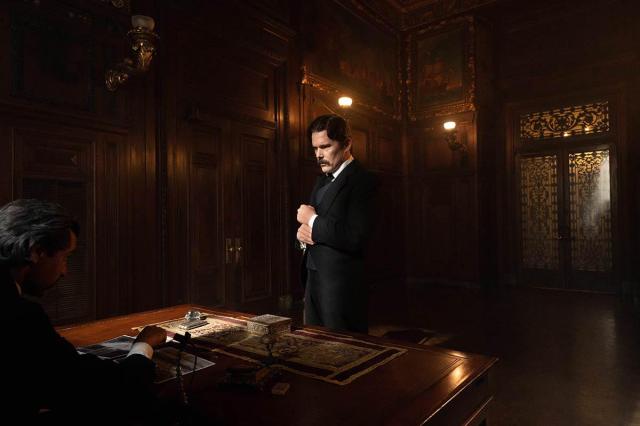All due credit to Michael Almereyda for approaching the biopic with an aim to color largely outside of the lines. His latest, the Ethan Hawke-led Tesla, employs multiple disparate and attention grabbing stylistic oddities to make for what it hopes is a different kind of historical study of a storied man. Indeed, the film’s flirting with neon lighting and anachronisms within the staid genre are certainly valid ways to highlight how Nikola Tesla stood apart from his contemporaries. But unlike the famous inventor that the film depicts as an outsider among American scientists, Tesla largely disappoints because it is far more conventional than it leads you to believe.

With Hawke at its center, the film tells of Tesla’s rise opposite the more embraced and financially supported experimentations of Thomas Edison (Kyle MacLachlan). Almareyeda positions Tesla’s immigrant identity as intrinsic to his otherness, with Edison’s acceptance and confidence reflected as a natural extension of the American machine. While narrated by Anne Morgan (Eve Hewson), the daughter of banking icon J.P. Morgan, we begin in Tesla’s early days developing alternating electrical currents. But it’s not until he breaks away from the city and Edison’s company that his genius is able to thrive.
In tandem, so goes the film’s idiosyncrasies. Until this point, Hawke is largely silent and gruff, fading into the Almereyda’s shadowy tableaus. But Tesla striking out on his own finds the director and actor free to take similarly bolder steps, including a faded technicolor karaoke session set to Tears for Fears. Almareyda uses matte paintings of intentional staginess and shifts the film’s color palatte to more electric vibrancy. Tesla finds his innovation as the movie finds its own, somewhat gleeful in its alienating formal creativity.
And yet even with all of the film’s oddness, its perceptions on era and character doesn’t go any deeper than the standard, cliched biopics it attempts to transcend. Some of this derives from Almereyda’s mostly minor key touch in his more straightforward sequences, but it is also exaccerbated by limiting characters to more conceptual beings than human ones. When not going out on a limb, the film’s narrative details simply fall flat. Its audacity merely registers as one-note insight, despite how Tesla offers sprinkles of the truly unique. If Hawke’s Tesla’s iconoclastic nature makes him more interesting than his peers, under this equated presentation, shouldn’t Almereyda prove moreso than his own?

Where Tesla fascinates more richly is how it examines the finances of invention, the ways innovation is encumbered by the bureaucracy of money people. Here is another angle that makes Tesla seem like a stand-in for the filmmaker himself, allowing a visionary among profiteers to break from that ecosystem. The film could easily be read as a comment on the state of modern cinema, moving forward only as industry and with true inspiration only happening off the grid. Unfortunately, this makes Tesla feel like it is for Almereyda and no one else. But perhaps that’s just fine too.
Maybe the film’s satisfaction with itself is enough to fulfill it’s own goals – it doesn’t need to satisfy us, it just needs to stand alone. Tesla may not be much better than other, tamer biopics, but it also doesn’t get lost among them.
C+
